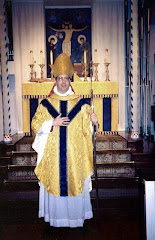20 May 2009. Vigil of the Ascension
Dear Bishop Duncan,
I thank you for your invitation to attend as an observer the inaugural Provincial Assembly of the Anglican Church in North America, which is to gather in Bedford, Texas, from June 22nd to 25th. I congratulate those who will assemble on their movement out of the Episcopal Church. Whatever else we agree or disagree about, we believe that that movement is correct.
Those of us who left the Episcopal Church and Anglican Communion a generation ago believe that the ordination of women was then the central problem in the Canterbury Communion. The notion that women can receive the sacrament of Holy Orders in any of its three parts constitutes, in our view, a revolutionary and false claim: a claim false in itself; a claim destructive of the common ministry that once united Anglicans; and, finally, a claim productive of an even broader and worse consequence. That worse consequence is the claim that Anglicans have authority to alter important matters of faith and order against a clear consensus in the central tradition of Catholic and Orthodox Christendom. Once such a claim is made it may be pressed into service to alter any matter of faith or morals. The revolution devours its children. Many of the clergy represented at GAFCON and now joining the ACNA seem to us to accept the flawed premise and its revolutionary claim in one matter while seeking to resist the application of the premise in the matter of homosexuality. This position seems to us to be internally inconsistent and impossible to sustain successfully over time.
In brief, then, we would suggest that the only sound basis for Continuing Anglican life is something akin to that already established in the Affirmation of Saint Louis with its clarity concerning the subordination of all Anglican authorities to the central tradition of Christendom.
We make this suggestion with a strong recognition of our own personal and ecclesial failures. But the failure of the Continuing Churches to unite and grow sufficiently does not at all alter the cogency of our observations about your own fundamental principles. Our own history teaches us that anything other than clear agreement on all significant doctrinal issues at the outset will lead eventually to division and decline.
To put matters another way, already now at the beginning of your enterprise, your dioceses and bishops are only in a state of impaired communion with each other. Some of your bishops do not recognize the validity of the priestly ministry of a significant body of clergy in other dioceses. Such divisions and problems at the beginning will not resolve themselves in time, but rather will grow. Ambiguity, or local option, or silence cannot undo the damage of essential disagreement concerning Holy Orders and authority in the Church.
In summary, then, we see in the ACNA the fundamental alterations in traditional Anglican faith, worship, order, and practice that led to the formation of our own Continuing Church in 1978. We would be glad to establish conversations with your ecclesial body in hopes that you may, having freed yourselves of the Episcopal Church, continue further on the same path by decisively breaking from a corrupt Anglican Communion and by returning to the central tradition of Christendom in all matters, including the male character of Holy Orders, the evil of abortion, and the indissolubility of sacramental marriage. We recommend to your prayerful attention the Affirmation of Saint Louis, which we firmly believe provides a sound basis for a renewed and fulfilled Anglicanism on our continent.
We suspect that any Anglican body that permits the ordination of women, or otherwise fails to return to the central tradition of Christendom, will soon move from what we might call neo-Anglicanism, which is already removed in ministry and worship from classical Anglicanism, and will eventually merge into the general stream of evangelical Protestantism. While faithful Protestantism of that sort is far preferable to what the Episcopal Church has become, it is not the Catholic Faith which we hold, it is not the Anglicanism that formed us, and it does not seem to us to have a bright future.
We have already communicated with persons in the ACNA about the Anglican Catholic Church's prior use of the name you have adopted (ACNA). We are certain that this matter can be successfully resolved to our mutual satisfaction, but pending such resolution we do note our prior use.
I fear that this letter in response to your kind invitation may seem somewhat abrupt. I do not mean it to be such. I wish instead to indicate clearly that our first principles seem to be very different. A fruitful dialogue would need to begin with those principles, and the plans outlined in your letter for the Bedford meeting do not seem to encompass such fundamental questions. I would be happy, however, to assist in the establishment of such dialogue in the future if the ACNA is not wedded to its position on the ordination of women and the authority of Anglican bodies to alter matters of faith and order.
With all good wishes, I am,
Faithfully yours in Christ,
(The Most Reverend) Mark Haverland, Ph.D.
Acting Primate, Anglican Catholic Church
Subscribe to:
Post Comments (Atom)


























No comments:
Post a Comment